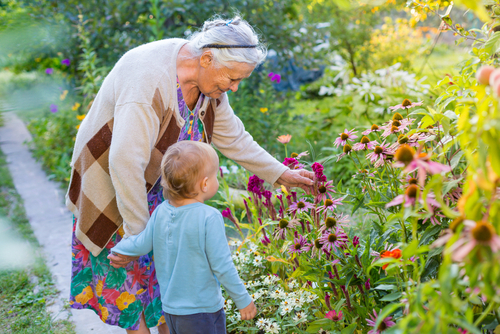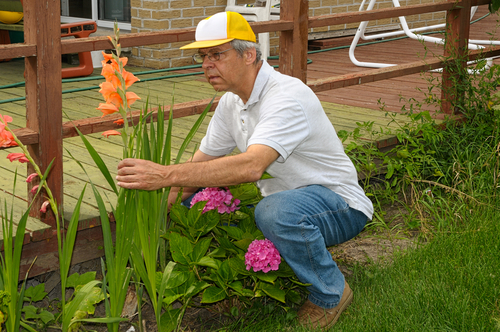
Page contents
How does gardening benefit people living with dementia?
Spending time outside has many benefits for our mental and physical wellbeing, and when the warmer weather rolls around, there’s arguably nothing better than spending time in a garden you’ve invested time and love into.
But for people with dementia, gardening offers much more than reaping the rewards of their hard work.
Nick White, Nature Recovery Ranger for Centre of Sustainable healthcare, explains why gardening can resonate so deeply with people living with dementia:
“One of the ways to view dementia is like shaking a full bookshelf, with your earliest memories at the bottom and your most recent memories at the top.
“When you shake the bookcase the first books to fall are the ones at the top, representing your most recent memories, while those at the bottom, your core childhood and embedded memories, fall last.
“For many people, being amongst nature and gardening is part of their core, childhood memories which is why gardening and being outdoors can be so beneficial and bring so much comfort to those suffering with dementia.”
Why is gardening good for wellbeing?
As well as bringing comfort, spending time in the garden can also positively contribute to a person’s physical, emotional, and cognitive wellbeing by:
– Increasing physical activity
– Positively contributing to cognitive function
– Offering opportunities for social interaction
– Providing focus and a sense of purpose
So with all of those benefits in mind, you’re probably keen to get out in the garden right away. But where should you start when encouraging a person living with dementia to get involved with gardening?
Here are just a few ways to make gardening a regular part of your, or your loved one’s, life in an easy and accessible way.
What are good gardening activities for someone with dementia?
Living with dementia, or caring for a loved one with the condition, comes with many challenges and gardening may be the last thing on your mind. For this reason, getting out can seem like a completely unreachable task, and so a really good place to start is to simply get to know your garden. whether for the first time or to refamiliarise yourself with the space.
Ensure they feel safe
Lauren Frake, Elderly Care Expert at Taking Care Personal Alarms, says:
“When reintroducing gardening to someone with dementia, one of the first steps to task is to ensure they feel safe in their environment. A good first step is to walk them around their garden, let them feel and touch the plants – especially ones with bright colours and textures. This will help distract them and enable them to focus on what they are doing in that moment.
In addition to selecting plants and flowers that have an impact, there are other things you can do to help make sure your garden space can be enjoyed throughout the seasons:
- Add sheltered areas for protection from the wind and the rain – you could also get some outdoor heating for extra warmth.
- Include seating so that the garden can be viewed from a safe and comfortable spot.
- Install handrails for safety, especially for when paving slabs are wet and slippery.
Make the tasks small and manageable
“It is also good to provide some clear guidance around the garden tasks they can get involved in. Break these steps down into manageable bitesize chunks so they don’t feel overwhelmed.”
Ms Frake also stresses the importance of using gardening as a way to boost confidence. She adds: “As much as gardening is a great social activity and may provide some guidance at first, we recommend encouraging them to take autonomy of some of the gardening, so they feel a sense of independence and individual achievement. Just keep an eye on them to make sure they’re safe and in distance if they need you.”
Simple activities such as planting herbs and feeding the birds
Rebecca Van Den Boogaard, Vocational Horticulture Learning Tutor at Workbridge and St Andrew’s Healthcare, a complex mental health charity, offers some advice for getting involved in some simple gardening tasks:
“Many gardening activities can still be enjoyed by people who have dementia, especially in the earlier stages of the disease.
“As a rule of thumb, spikey or toxic plants should be avoided, and the key is to keep it simple.
“Activities and plants that I would recommend are mowing, growing fruit, vegetables, annuals, and herbs. Feeding the birds is also rewarding.
“Peas are easy to sow and a quick crop, (and delicious eaten straight from the vine), as are lettuces, perpetual spinach, and radishes. Sensory plants with strong scents and even flavours are excellent. I recommend stocks, lavender, calendula, nasturtium, Mint, oregano, thyme, fennel, sweet peas, and common jasmine.”

Grow seasonal plants to trigger positive memories
Gardening shouldn’t just be for summer. Nature offers something to enjoy and appreciate each month, and this is especially poignant for people living with dementia, as certain seasonal signifiers can help to provoke positive memories.
Dr Susanne Lux, Project Manager for Pelargonium Europe, comments:
“Flowers and plants are well-known mood enhancers and sitting or walking in a beautiful, blooming garden can have a positive effect on our emotional wellbeing and mental health.
“For a person suffering with dementia-related memory loss, different varieties of plants may help to remind them of the time of year, such as daffodils at the start of spring or sun-loving plants like geraniums which herald the onset of summer. The olfactory sense is very evocative, and it may be possible for intensely perfumed flowering plants to trigger happy memories whilst also having a soothing effect.”
Create a sensory garden
Sensory gardens don’t need to be the magnificent work of art you may be picturing, it’s all about creating an outside space that engages the different senses and helps to provoke memories.
To create a sensory garden, you could:
- Plant different coloured flowers and plants – consider things like texture and scent too to engage more of the senses.
- Include a water feature – if you’re limited on space there are portable options which can be moved around and don’t require full installation.
- Hang wind chimes to offer a gentle sound.
- Consider growing herbs or vegetables that can be eaten.


